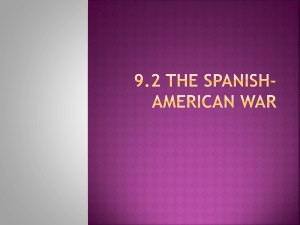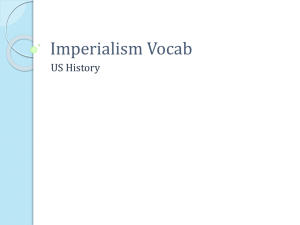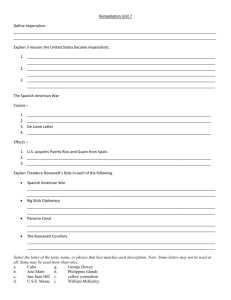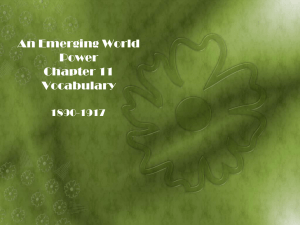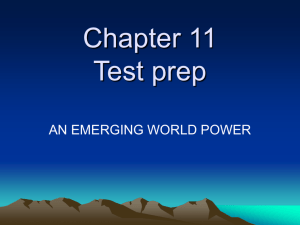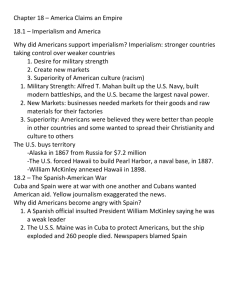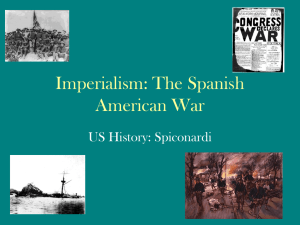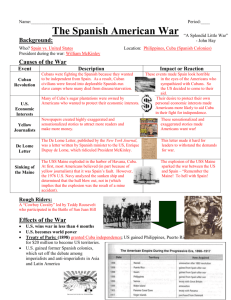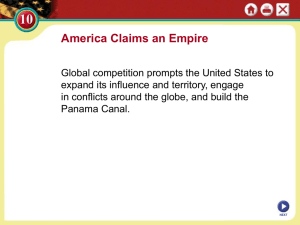Unit 3 PowerPoint
advertisement
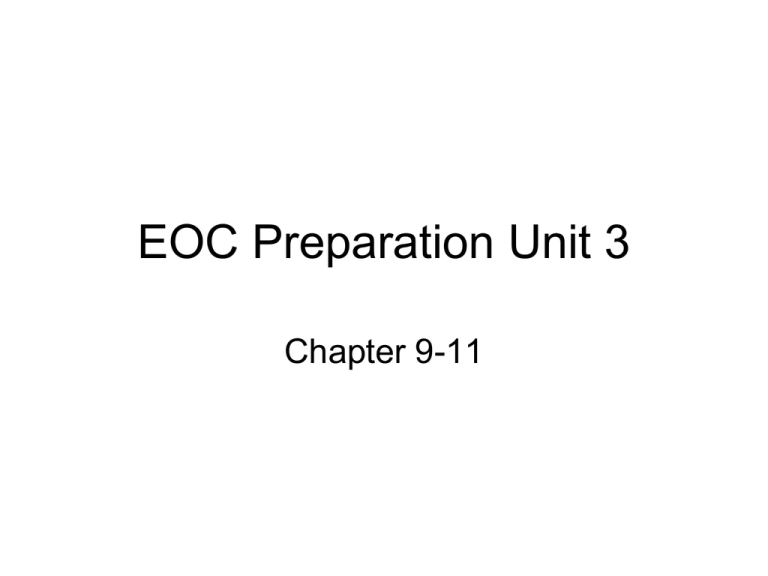
EOC Preparation Unit 3 Chapter 9-11 1. The Progressive Movement aimed to restores opportunities and correct injustices in American life. 2. The four goals of the progressive movement include, protecting Social Welfare promoting moral improvement, creating moral reform and fostering efficiency. 3. Florence Kelley was an advocate for improving the lives of women and children. 4. Prohibition is the banning of alcohol, sales and consumption. 5. One fundamentalists group that fought for prohibition was the Women’s Christian Temperance Union 6. This style of news reporter known as Muckrakers wrote about the corrupt sides of business and public life. 7. Initiative is a bill originated by the people rather than lawmakers. 8. Referendum is a vote by the people on a given initiative. 9. Recall enables voters to remove public officials from elected positions by forcing them to face another election before the end of their term if enough voters asked for it. 10. In the fight for women’s rights one of the leading proponents was Susan B. Anthony 11. The right for women to vote is known as suffrage 12. A leading group fighting for women’s suffrage was the National American Women’s Suffrage Association 13. A famous muckraker that wrote The Jungle Upton Sinclair 14. Theodore Roosevelt became president after William McKinley was killed. 15. The term Square Deal was used to describe various progressive reforms sponsored by the T. Roosevelt administration. 16. Trusts, are legal bodies created to hold stock in many companies—in the early 1900s they controlled about 4/5 of the industries in the United States. 17. In a recall of the Sherman Anti-Trust, Roosevelt became known as a Trust-Buster. 18. In the 1902 Coal Strike 140,000 miners in Pennsylvania went on strike and demanded a 20% raise, 9 hour work days and the right to organize a union. 19. The Meat Inspection Act dictated strict cleanliness requirements for meatpackers and created the program of federal meat inspection. 20. The Pure Food and Drug Act halted the sale of contaminated foods and medicines and called for truth labeling. 21. Conservation is the act of preserving designated areas of wilderness. 22. The National Association for the Advancement of Colored People was founded in 1909 and aimed for equality amongst the races. 23. The Payne-Aldrich Tariff enforced high tariff rates 24. The Bull-Moose Party called for direction election of senators and the adoption in all states of initiative, referendum and recall. 26. The winner of the 1912 election was Woodrow Wilson 27. The Clayton Antitrust Act of 1914 sought to strengthen the Sherman Antitrust Act of 1890 and prohibited corporations from acquiring the stocks of another if doing so would create a monopoly. 28. The second major antitrust measure was the Federal Trade Commission of 1914 and was known as a “watchdog” agency. 30. The 19th Amendment granted women the right to vote. 31. Imperialism, is the policy in which in which stronger nations extend their economic, political, or military control over weaker territories. 32. Sanford B. Dole was part of the overthrow committee of Hawaii and helped set up a government. 33. An early supporter of American expansion William Seward secretary of state under Abraham Lincoln negotiated the purchase of Alaska from Russia in 1867. 34. Annexation is the process of incorporating territory into an existing country or state. 35. America had a particular interest in obtaining Cuba from Spain in the late 19th century, however; Spain refused. 36. Cuba Libre! Was the chant of Cubans desiring United States intervention to help Cuban rebels to achieve liberation from Spain. 37. A letter from Spain insulting William McKinley known as the De Lome Letter leaked out into the publications. 38. On February 15, 1898 the U.S.S. Maine blew up in a Havana bay harbor, this outraged American citizens and sparked the Spanish American War. 39. Much to the surprise of the Spanish government, the first invasion of the Spanish American War took place in a Spanish colony in the Philippine Islands. 40. In the Treaty of Paris America and Spain ended their war and came to some mutual agreements including: America bought the Philippines for $20million, Spain freed Cuba etc. 41. In 1900, the United States Congress passed the Foraker Act which ended military rule in Puerto Rico and set up a civil government. This act gave the U.S. President the power to appoint certain positions in Puerto Rican government. 42. Upon obtainment of Cuba the United States made provisions to the new Cuban constitution known as the Platt Amendment giving the U.S. some control. 43. A Protectorate is a country whose affairs are partially controlled by a stronger power. 44. The Open Door Notes were letters addressed to leaders of imperialist nations proposing that the nations share their trading rights with the United States. 45. The Boxer Rebellion was the attempted slaughter of Western influence in China. The U.S., Britain, France and Germany helped stop this rebellion, many Chinese died. 46. The United States purchased for $40million from France a canal through panama. The United States needed permission from Colombia to construct the Panama Canal. When Colombia refused the U.S. initiated a Panamanian rebellion against Colombia. 47. Dollar Diplomacy is a policy of using the nation’s economic power to exert influence over other countries. 48. The Roosevelt Corollary was an addition to the Monroe Doctrine, it allowed military intervention for the U.S. to protect its economic interests internationally. 49. The main causes of the first World War were Nationalism, Imperialism, and Militarism 50. Nationalism, is a devotion to interests and cultures of one’s own nation 51. Militarism is the development of armed forces and their use as a tool of diplomacy. 52. An alliance system, was formed with the Allies consisting of France, Britain Russia, later being known as the Triple Entente 53. The Triple Alliance consisted of Germany, Austria-Hungary and Italy later known as the Central Powers 54. The assassination of Archduke Franz Ferdinand of Austria, kicked off WWI due to the alliance system. 55. The Lusitania, a British liner carrying Americans was sunk by a German U-Boat. 56. The Zimmerman Note a telegram from the German foreign minister to the German ambassador in Mexico that was intercepted by British Agents, led to American distrust of Germany. 57. The Selective Service Act required men to register with the government in order to be randomly selected for military service. 58. In 1918, Germany agreed to a cease-fire and signed the Armistice, or truce, that ended the war. 59. The War Industries Board was the main regulatory body established in 1917 and promoted mass production and increased efficiency of production. 60. The Espionage and Sedition acts was passed in May 1918 and a person could be fined or given jail time for interfering with the American War effort. 61. The Great Migration was the large-scale movement of hundreds of thousands of Southern blacks to cities in the north. 62. Wilson’s Fourteen Points were a speech and Wilson’s plans for world peace. 63. The last of Wilson’s fourteen points called for the creation of the League of Nations a peace keeping organization for international leaders to negotiate. 64. The Treaty of Versailles established 9 new nations, changed borders. 65. The treaty also demanded that Germany return the region of Alsace-Lorraine to France and to pay reparations, or war damages, $33billion to the Allies.
